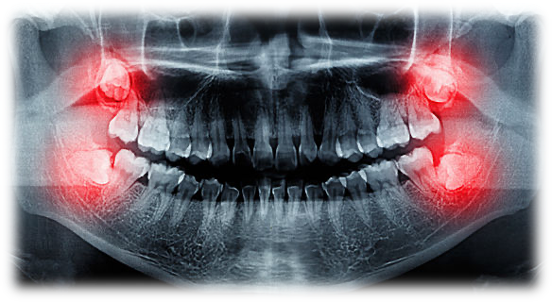WHEN DO YOU NEED WISDOM TOOTH SURGERY/EXTRACTION?
If there is enough room, sometime wisdom teeth can be a valuable asset to the mouth when healthy and properly aligned, and do not cause any problems. When these teeth grow you will be a little sore and/or feverish. These feelings are only temporary and will stop when the teeth grow completely and properly aligned.
When wisdom teeth are misaligned, they may position themselves horizontally, be angled toward or away from the second molar, or be angled inward or outward. Poor alignment of wisdom teeth can crowd or damage adjacent teeth, the jawbone, or nerves. Wisdom teeth also can be impacted — they are enclosed within the soft tissue and/or the jawbone or partially break through or erupt through the gum. Partial eruption of the wisdom teeth allows an opening for bacteria to enter around the tooth and cause an infection, which results in pain, swelling, jaw stiffness, and general illness. Partially erupted teeth are also more prone to tooth decay and gum disease because their hard-to-reach location and awkward positioning makes brushing and flossing difficult. In this case the wisdom teeth need to be extracted. This is specially true if you have already gone through orthodontics to achieve that perfect smile.
The American Association for Oral Maxillofacial Surgeons recommends removing wisdom teeth by the time people is a young adult to prevent future problems and allow for proper healing.


IS WISDOM TOOTH EXTRACTION COMPLICATED?
It’s all depend on the location and shape of the wisdom tooth such as: impacted wisdom tooth, the wisdom tooth’ s root get longer,… it will make the extraction more difficult and will increase the potential of complications such as affected nerve. It will be disappear after 2 weeks. Our doctors will explain to you after taking X-rays.
Wisdom tooth/teeth extraction are always performed under local anesthesia (or sedative anesthesia for sensitive person).
At Worldwide Beauty and Dental Hospital, we use Piezo machine, atraumatic equipment to do atraumatic extraction for wisdom tooth/ teeth, ensuring little to no pain nor less swelling.
Contact

 Tiếng Việt
Tiếng Việt

